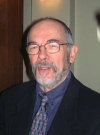John Rickard

John Rickard is the author of Australia: A Cultural History (2017). In his youth he worked as an actor and singer.
When Take Me to Paris, Johnny was first published in 1993, the AIDS crisis seemed to be at its worst. Many of us had friends and acquaintances who were dying. One began to notice men who, thin and haggard, one feared were suffering from AIDS (women victims being relatively few in number). There was no sign of the drug therapies that would, towards the end of the decade, begin to transform the trea ... (read more)
Hector Crawford is a unique figure in the history of Australian radio and television. The Australian Dictionary of Biography article (also by the author of this book) describes him as 'television producer, media lobbyist and musician', to which could be added radio producer, showman, and entrepreneur. Above all, he was a persistent and canny advocate of Australian content at a time when the infant ... (read more)
Why Acting Matters has on its cover the face of an ape; well, actually it’s Andy Serkis playing Caesar, ‘the top ape’ in Dawn of the Planet of the Apes (2014). The point of this rather unexpected image from a movie not discussed in the book is, the blurb tells us, that ‘acting is baked into our primate DNA’. These two books, however, by elder statesmen in their respective fields, are con ... (read more)
Many years ago, when I was struggling to make a living as an actor–singer in England, I spent six months in the chorus at the London Palladium, in a show breezily titled Let Yourself Go, whose star was former Goon Harry Secombe. It was hard work: two performances nightly, plus a matinee on Saturday. Years later, I realised that this demanding regimen was inherited from the days of music hall, wh ... (read more)
Norman Haire was born in Sydney’s Paddington in 1892, the year in which the word ‘homosexual’ is said to have entered the English language in the translation of Krafft-Ebing’sPsychopathia Sexualis. It was a coincidence Haire might have enjoyed, though for a man given to speaking his mind he was always discreet about his homosexuality.
... (read more)
Darrell Lewis first encountered the Victoria River District of the Northern Territory in 1971 when he worked as a field assistant for the Bureau of Mineral Resources. ‘There was an aura about the country which fired my imagination,’ he writes. Since then, as an historian and archaeologist, he has become an authority on the Victoria River District, the land, its history, and its rock art. Now a ... (read more)
Annette Kellerman, described by Angela Woollacott as ‘swimmer, diver, vaudeville performer, lecturer, writer and a silent-film star’, has been rediscovered in recent years. In 1994 Sydney’s Marrickville Council renamed its Enmore Park Swimming Pool, upgrading it from a humble pool to the Annette Kellerman Aquatic Centre, in honour of the international celebrity, who briefly lived in the neig ... (read more)
I first saw Summer of the Seventeenth Doll in 1957 in London, of all places. I remember feeling some pride in seeing the symbolic kewpie doll presiding over the New Theatre in the heart of the West End. June Jago’s performance as Olive has stayed with me over the years; Philip Hope-Wallace, the Guardian reviewer, described her as ‘all chin and elbows, but as genuine a dramatic actress as you c ... (read more)
I first saw Summer of the Seventeenth Doll in 1957 in London, of all places. I remember feeling some pride in seeing the symbolic kewpie doll presiding over the New Theatre in the heart of the West End. June Jago’s performance as Olive has stayed with me over the years; Philip Hope-Wallace, the Guardian reviewer, described her as ‘all chin and elbows, but as genuine a dramatic actress as you c ... (read more)
